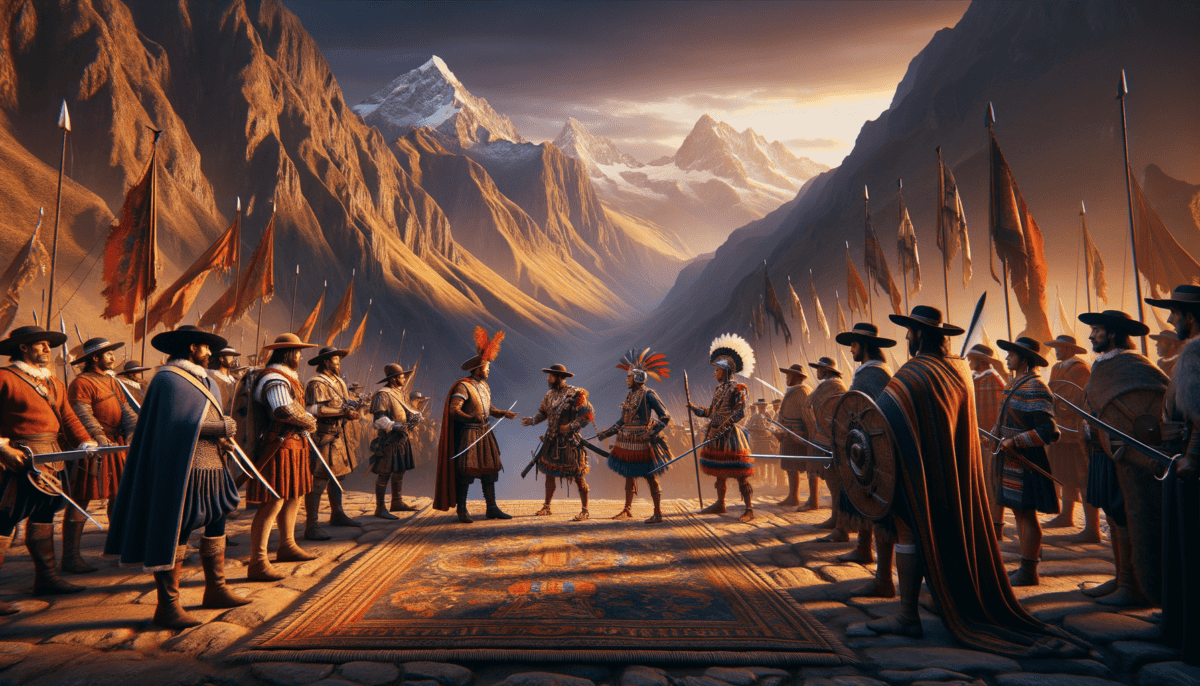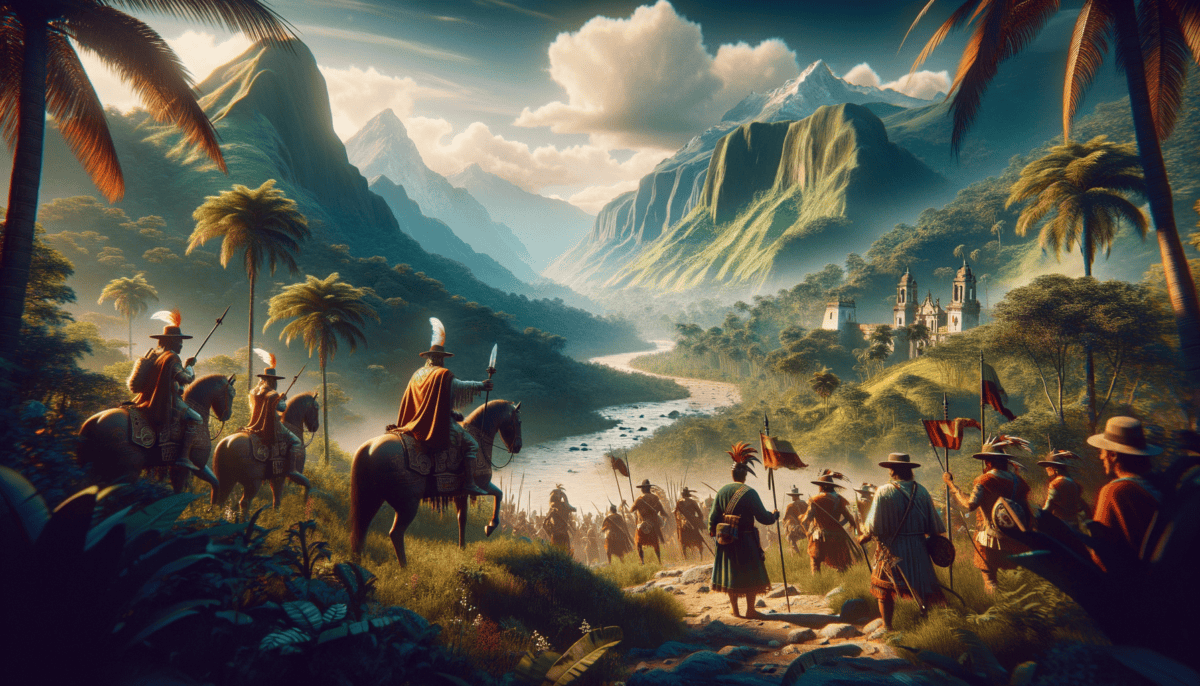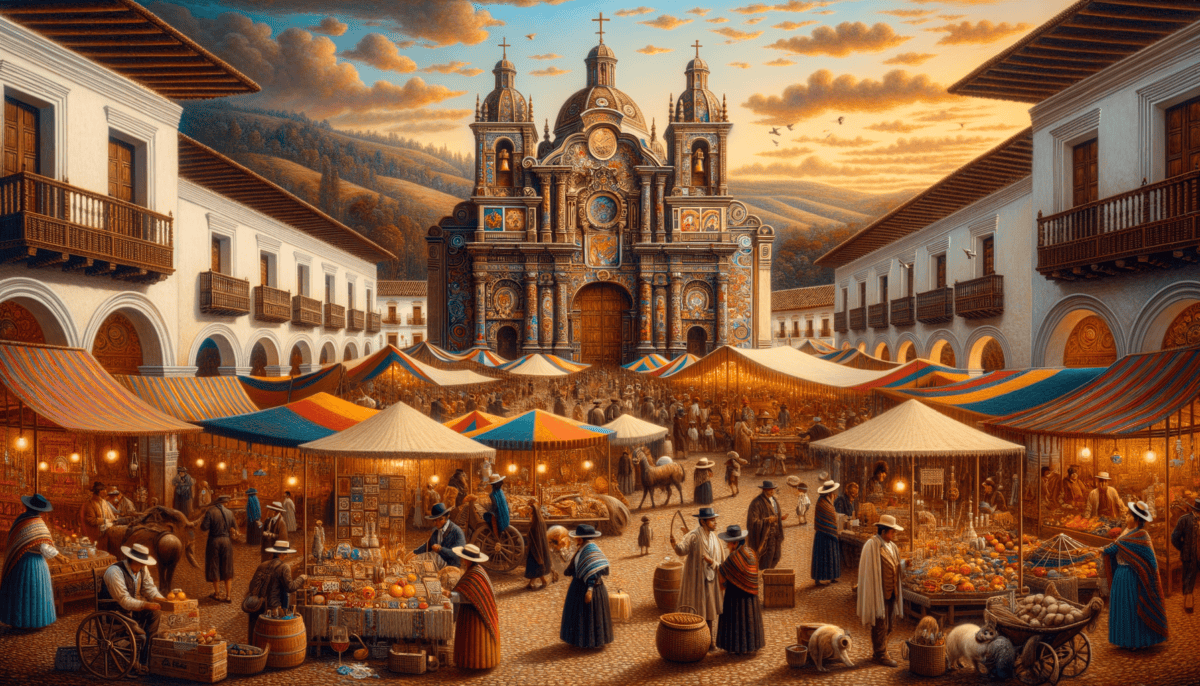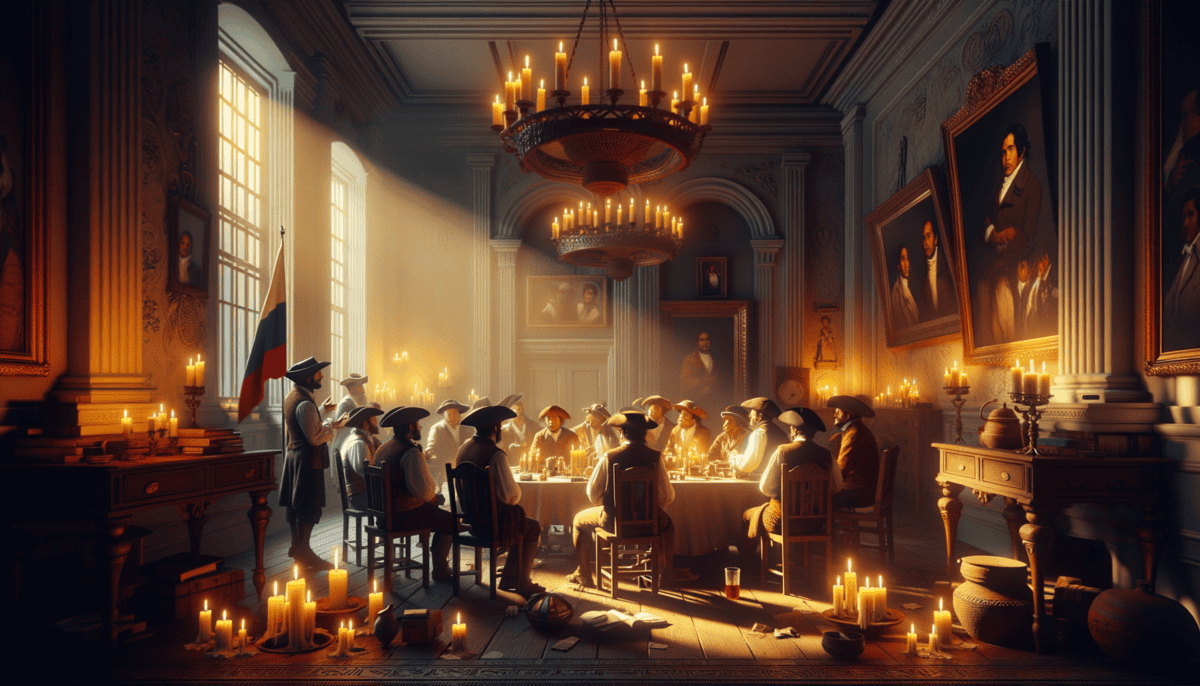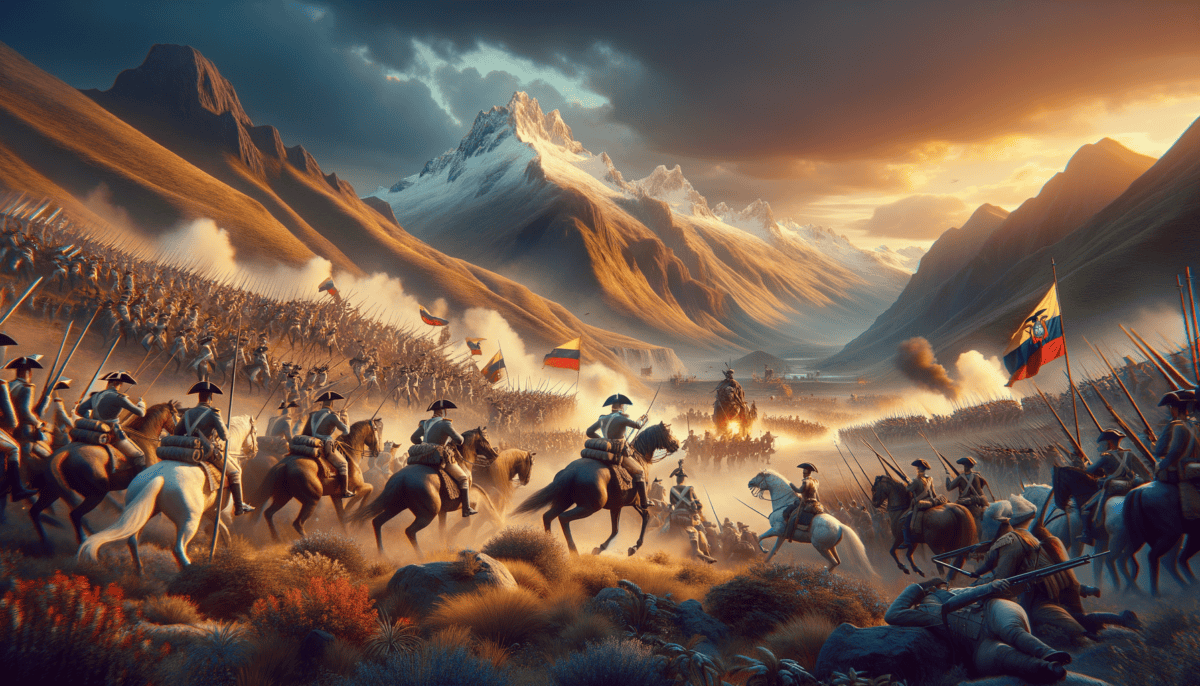A Mighty Empire in the Mountains
The sun rose over the majestic Andes Mountains, painting the sky in brilliant shades of orange and gold. High in these mountains, where the air was thin and cool, lived a powerful people called the Inca.
Young Kusi, a twelve-year-old boy, stood beside his father on a terraced hillside. They watched as their great leader, Tupac Yupanqui, addressed the crowd gathered below.
"Father, why are there so many people here today?" Kusi whispered.
His father smiled proudly. "Our great Sapa Inca is expanding our empire, my son. Today we celebrate bringing new lands into our family."
The Inca were amazing builders. They created huge cities using stones that fit together so perfectly, you couldn't slip a piece of paper between them! ️ Their most famous city, Cusco, had streets laid out in the shape of a puma – a powerful mountain lion.
“The Inca were master farmers too,” Kusi’s father explained. “See these terraces? They’re like giant steps cut into the mountain. We can grow food even on the steepest hills!”
The terraces weren't just for growing food. They helped stop rain from washing away the soil, and different levels were used for different crops. Some levels were warmer, others cooler – perfect for growing many types of food!
Here are some amazing things the Inca created:
- Roads that stretched for thousands of miles
- Bridges made from grass that were stronger than rope
- Messages sent using colored strings called quipus
- Cities built without using any wheels or iron tools
"But how do we build such wonderful things without metal tools?" Kusi asked.
His father picked up a stone and showed it to him. "We use harder stones to shape softer ones. Water helps too – we let it freeze in cracks to split bigger rocks. The gods gave us wisdom to work with what we have."
As the sun climbed higher, Kusi watched runners arrive from distant parts of the empire. These chasquis carried messages across the mountains, running relay-style like a giant game of tag. Each runner would sprint to the next station, where a fresh runner waited to carry the message forward. ♂️
The people spoke different languages throughout the empire, but they all learned Quechua, the language of the Inca. This helped everyone understand each other, like one big family.
As evening approached, Kusi and his father joined the celebration. Musicians played flutes and drums while dancers moved in colorful costumes. The air filled with the smell of roasting corn and potatoes – foods the Inca had learned to grow better than anyone else in the world.
"One day," his father said, watching the stars appear over the mountains, "you'll help make our empire even greater. Remember, Kusi – we build not just with stones, but with wisdom, cooperation, and respect for Pachamama – Mother Earth."
The boy nodded, feeling proud to be part of such an amazing civilization. As fires flickered across the terraced hillsides, he imagined how far the Inca empire would grow, spreading their knowledge and culture across the magnificent Andes Mountains. ⭐
When Two Worlds Collide
The morning mist hung heavy over the Andean mountains as Marina, a young Inca girl, helped her grandmother gather herbs. Suddenly, strange sounds echoed through the valley. ️
“Grandmother, what is that noise?” Marina asked, her heart beating faster.
“Something new has arrived in our lands,” her grandmother whispered, pulling Marina closer. “Men wearing shiny metal, riding giant beasts.”
“They call themselves Spanish,” explained Marina’s uncle, who had just rushed up the mountain path. “They carry thunder sticks that shoot fire, and their metal suits shine like the sun.”
The Spanish brought many things the Inca had never seen before:
- Horses that seemed as tall as houses
- Guns that made loud booming sounds
- Shiny armor that arrows couldn’t break
- Strange new animals called pigs and chickens
But they also brought invisible enemies – tiny germs that made many Inca people very sick.
One day, Marina watched from behind a stone wall as Spanish soldiers marched through her village. Their leader, Francisco Pizarro, rode a tall brown horse.
“Look at their strange clothes,” whispered her friend Titu. “And why do they cover themselves in metal when it’s so hot?”
The Spanish soldiers tried to talk to the Inca people, but they spoke a different language. Sometimes they used signs with their hands to trade gold for colorful glass beads.
Marina’s grandmother shook her head sadly. “They want our gold, but they don’t understand that to us, corn is more precious than gold. You can’t eat gold.”
The meeting of these two different worlds brought big changes. Some were good, like new foods:
️ The Spanish learned about potatoes, corn, and tomatoes
The Inca got chickens, pigs, and cows
But there were also scary changes. The Spanish wanted to change how the Inca lived. They didn’t understand the Inca’s beautiful ways of farming or their special connection to Pachamama (Mother Earth).
“Why do they want us to change?” Marina asked her grandmother one evening as they watched the sunset paint the mountains red.
“Sometimes people fear what they don’t understand,” her grandmother answered softly. “But remember, Marina – our ways are in our hearts. No one can take that from us.” ❤️
As night fell over the mountains, Marina could see fires burning in both the Inca villages and the Spanish camps. Two different worlds, side by side, like stars reflecting in a mountain lake. Neither knew that soon, everything would change forever.
In the distance, drums began to beat. The sound echoed off the mountains – a warning that more Spanish soldiers were coming. Marina held her grandmother’s hand tightly as they watched more fires light up the valley below. The time of peace was ending, and a great struggle was about to begin.
The Warrior’s Heart
High in the mountains of what we now call Ecuador, a brave warrior named Rumiñahui stood watching the Spanish camps below. His name meant “Stone Face,” but his heart burned with love for his people.
“They think their metal and horses make them strong,” he said to his trusted friend Qispi. “But we have something stronger – we know every rock and tree of these mountains.”
The Inca warriors had special ways to fight in the mountains:
- They could run fast on steep paths where horses couldn’t go
- They knew hidden caves and secret trails
- They could send messages using drums that echoed in the valleys
- They could survive in the cold mountain air that made Spanish soldiers shiver
One morning, Qispi rushed to Rumiñahui with news. “The Spanish are coming up the mountain path!” ♂️
Rumiñahui smiled. “Then let’s teach them how we fight in the clouds.”
“Roll the stones!” Rumiñahui’s voice boomed across the mountainside. Huge rocks crashed down the slopes, making the Spanish horses rear up in fear.
The Spanish soldiers had never fought in places like this. Their heavy metal armor made it hard to breathe in the thin mountain air. Their horses couldn’t climb the steep, rocky paths.
️ “The fog is our friend,” Rumiñahui told his warriors. “When it comes, we can move like mountain cats while they stumble like blind men.”
Little Marina, who we met before, watched from her hidden spot as Rumiñahui’s warriors appeared and disappeared in the mist. She could hear the Spanish soldiers calling out in confusion.
“Look!” she whispered to her friend Titu. “Our warriors are as clever as condors!”
But even with all their clever tricks, fighting the Spanish was hard. The Spanish had weapons that could hurt people from far away, and more soldiers kept coming.
“Take everything valuable from the temples,” he ordered. “Hide it where they will never find it.”
At night, lines of people carried gold and special things into secret caves. Marina helped too, carrying a small golden cup that sparkled in the moonlight. ✨
“Where are they taking everything?” Titu asked.
“To a place so secret, no one will ever find it,” Marina answered. “My grandmother says it’s better lost than stolen.”
Rumiñahui fought bravely for many months. When he knew he couldn’t win, he made sure the Spanish would never find the Inca’s precious treasures. Some people say they’re still hidden in the mountains today.
The Spanish finally captured Rumiñahui, but they couldn’t capture his spirit. He never told them where the treasures were hidden, even when they were mean to him.
As the sun set over the mountains that evening, Marina’s grandmother told her, “Remember Rumiñahui’s courage. He showed us that being brave doesn’t always mean winning – sometimes it means protecting what matters most.” ❤️
The story of Rumiñahui still lives in the mountains of Ecuador. People say that on misty mornings, you can hear drums echoing in the valleys, reminding everyone of the brave warrior who fought to protect his people’s way of life.
Two Worlds Meet
The sun rose over a changed Ecuador. Spanish flags now flew where Inca banners once danced in the wind. Little Marina watched from her window as people in different clothes walked the streets of her town.
“Mama,” Marina asked one morning, “why do we have to learn Spanish?”
Her mother braided Marina’s long black hair and smiled gently. “Because now we live in two worlds, my little hummingbird. We can learn new things while keeping our old ways in our hearts.” ❤️
“The Spanish brought different things to Ecuador:
• Different animals like cows and sheep
• Different clothes and ways to build houses
• A new language and new beliefs
In the marketplace, Marina saw Spanish ladies in long dresses walking next to Inca women in colorful ponchos. She heard people speaking both Spanish and Quechua, the language of her ancestors.
“Look, Marina!” called her friend Isabella, a Spanish girl. “My mother is learning to cook with quinoa, just like your family!”
Marina smiled. She had taught Isabella to count in Quechua, and Isabella had taught her Spanish songs. They were different, but they were friends.
At school, Marina learned about Spain and its kings. But at home, her grandmother still told stories about brave Rumiñahui and the hidden treasures. Some families, like Marina’s, started following both their old beliefs and the new Spanish ones.
“Can you tell me about the mountains again, Abuela?” Marina would ask at bedtime.
Her grandmother’s eyes sparkled. “Ah, the mountains. They remember everything, little one. They remember the Inca paths and now they watch the Spanish roads. They hold all our stories.”
During fiestas, Marina saw something amazing. Spanish guitars played next to Inca flutes. People danced steps from both worlds. The music was new but beautiful – not just Spanish, not just Inca, but something special that belonged to Ecuador.
One day, Marina heard grown-ups talking about changes. Some people weren’t happy that the Spanish made all the rules. They started to think about having their own way of running things.
“Why can’t we decide things for ourselves?” she heard someone ask. “We live here. We know our land.”
Marina wrote in her secret diary: “Ecuador is like a beautiful cloth woven from many different colored threads. Some are old, some are new. But together, they make something strong and beautiful.”
She didn’t know it then, but these thoughts about being independent were like tiny seeds. They would grow into something big – a dream of freedom that would change everything again.
As the sun set, Marina sat with her grandmother on their roof, looking at the mountains that stayed the same while everything else changed. “Remember, mi amor,” her grandmother said, “change can be hard, but it can also make new and wonderful things.” ✨
Dreams of Freedom
The morning sun painted Quito’s streets gold as Carlos rushed through the marketplace. His heart raced with excitement – tonight his father would attend a secret meeting about Ecuador’s future.
“Papa, can I come too?” Carlos whispered at breakfast.
His father looked around carefully before answering. “No, hijo. But I’ll tell you about a brave man named Eugenio Espejo who started these dreams of freedom.”
“Tell me more!” Carlos leaned forward eagerly.
“Espejo wrote in secret papers about freedom. He said everyone should have a chance to learn and grow. His ideas spread like wildfire through our city.”
That afternoon, Carlos played with his friend Miguel in the plaza. They pretended to be revolutionary heroes, using sticks as swords.
“I heard my papa talking about meetings,” Miguel whispered. “They’re planning something big!”
People across Ecuador were starting to think new thoughts:
• Why can’t we govern ourselves?
• Don’t we deserve to be free?
• Shouldn’t we control our own future?
At home, Carlos’s mother was teaching his sister Rosa to read – something that wasn’t allowed before. “Knowledge is power,” she said with a wink.
That night, Carlos couldn’t sleep. He heard voices downstairs as his father’s friends arrived quietly. Through the floorboards, he caught whispers of exciting words: “liberty,” “independence,” “revolution.” ⭐
“What are you doing?” Rosa appeared beside his bed.
“Shh! I’m listening to history happening!” Carlos pulled her down beside him.
The next morning, Carlos noticed something different in the streets. People walked taller, spoke more boldly. In the marketplace, a woman sang a new song about freedom.
“Papa,” Carlos asked at dinner, “will there be fighting?”
His father’s face grew serious. “We hope for peaceful change, hijo. But sometimes you must fight for what’s right. Remember, even the mighty Andes Mountains were shaped by great forces.” ️
Carlos started keeping track of secret signs – yellow flowers in windows meant a meeting that night. Whispered conversations stopped when Spanish soldiers passed by. Everyone seemed to be waiting for something big.
One evening, his father came home with exciting news. “A man named Simón Bolívar is gathering an army. He dreams of all South America being free!”
That night, Carlos drew pictures in his notebook – Ecuador’s flag flying free, people celebrating in the streets, Spanish soldiers leaving. His dreams were getting bigger, just like Ecuador’s dreams of freedom.
As stars appeared over Quito, Carlos and Rosa sat in their window, imagining what a free Ecuador would be like. The air felt electric with possibility, like the moment before a thunderstorm.
“Soon,” their father promised, hugging them close. “Soon we’ll write our own story.” ✨
Triumph at Pichincha
The dawn mist swirled around Pichincha volcano as Carlos peered through his window. Today would change everything – May 24, 1822. Simón Bolívar’s army was coming!
“Look!” Rosa tugged his sleeve. “The soldiers are gathering!”
Their father appeared, wearing a yellow armband. “Today we fight for our freedom, mis hijos.” He hugged them tightly.
The streets buzzed with excitement. People whispered about Sucre’s brave plan to climb the volcano at night. Carlos watched soldiers march past, their boots echoing on cobblestones.
“Will we win, Papa?” Rosa’s voice trembled.
“We have something stronger than weapons,” he smiled. “We have hope.”
The battle sounds echoed through Quito:
Shouts of brave soldiers
Horses galloping
Victory cries rising
By afternoon, amazing news spread – the Spanish army was surrendering! People poured into the streets, celebrating with songs and tears of joy.
“We’re free!” Carlos jumped and danced. “We’re really free!”
That evening, bells rang across Quito. Families gathered in the plaza, sharing food and stories. Carlos saw Miguel waving an Ecuador flag his mother had sewn in secret.
“Remember this day,” his father said proudly. “You watched Ecuador become free.”
Over the next weeks, exciting changes happened. New schools opened. People spoke their native languages openly. Farmers kept more of their crops. Hope bloomed like spring flowers.
One morning, Carlos found his father reading a newspaper – printed right in Quito!
“Papa, what does it say?”
“It tells our story – how brave people fought for freedom, how we’ll build our new nation together.”
Years later, Carlos would tell his own children about watching Ecuador’s independence dawn. He’d describe the battle sounds, the celebration songs, the first raising of Ecuador’s flag.
“But the most important thing,” he’d say, “was believing we could be free. Once we believed, nothing could stop us.” ⭐
And so Ecuador grew strong and proud, writing new chapters in its story. The spirit of those brave freedom fighters lived on in its mountains and valleys, its cities and farms, and most of all, in its people’s hearts.
The dream that started with whispered words became a mighty nation, proving that hope and courage can change the world.


